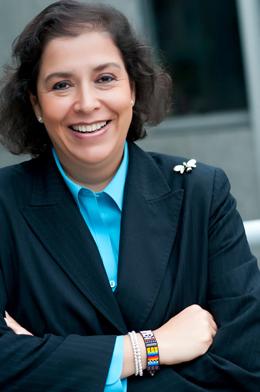Saving species with science
Coping with climate change is a key priority for conservation in the United States, says new science adviser.
 Gabriela Echavarria aims to raise the profile of the US Fish and Wildlife Service's science.Clinton Brandhagen Photography
Gabriela Echavarria aims to raise the profile of the US Fish and Wildlife Service's science.Clinton Brandhagen PhotographyIn July, Gabriela Chavarria was named the top science adviser for the US Fish and Wildlife Service (USFWS), based in Washington DC. Born in Mexico, she has a PhD in biology from Harvard University in Cambridge, Massachusetts, and 14 years of experience with non-governmental conservation organizations, most recently the Natural Resources Defense Council.
Her first big task will be presiding over the 27 September release of the service's national climate plan, titled "Rising to the Urgent Challenge".Nature spoke with her about the agency's scientific direction.
What are your goals as science adviser for the USFWS?
It has been pretty remarkable for me to see the amount of science that happens in this organization. It is something that is not well known on the outside. One of my priorities is to expand and publicize the work that we do, to promote the active involvement of the service's employees in the larger scientific community.
People say: "Oh, you're restoring science." No — science has been happening in this agency all the time. But scientists don't really have the time to promote themselves. I hope that I'll be able to bring them out to the scientific community, so that the USFWS can interact more and show the world what we're doing.
What will the scientific priorities be on your watch?
Climate change. This is not a future event — climate change is happening here and now. With it comes so many different things, such as habitat fragmentation and loss, water scarcity and the spread of invasive species.
What role will the USFWS have in addressing climate change?
Our national climate plan focuses on three areas: adaptation, mitigation and engagement. We've built a five-year plan of action, and will be working with federal agencies, non-profit companies, private landowners and stakeholders so that we can protect and connect large intact habitats that will support many species.
One of the biggest pieces of our plan is engagement. We're reaching out to the public and our partners so that we can share information, work together and find joint solutions. Because climate change is a challenge posed to everybody, we really need to engage the public.
We are already playing a big part in the science of climate change. A couple of years ago, the USFWS developed the Landscape Conservation Cooperatives. These are partnerships focused on informing on-the-ground strategic conservation efforts in defined geographical areas.
We are bringing the science to the ground. This is not a Washington thing. We are providing the science at the regional level, so that each region addresses its key challenges.
How can the USFWS improve, and how will you go about strengthening the agency?
One thing that we haven't been good at is participating in scientific meetings. This is largely because people are very busy in the field collecting and analysing data. I want to highlight their work and encourage them to participate in the relevant meetings, and show the scientific community that we're doing really good work here.
The USFWS has been criticized for political interference with science, particularly with regards to which species are protected by the Endangered Species Act. How will you ensure the service's scientific integrity?
All of the work we do is based on science. All of the listing petitions we've seen in the past ten years have been scientifically based.
I'm starting to collaborate very closely with Gary Frazer, the director of the service's Endangered Species Program, to ensure that we bring lots of scientific expertise, that we hear a lot of the science out there and what it is saying about specific species. We have also enlisted the help of the US Geological Survey with a lot of species.
How will you keep the politics from hampering the science?
My job is to provide the best science available to our [acting] director [Rowan Gould], so that he is informed on the subject. And my job is to consult with the left, the right, the centre — with everybody. The final decisions are not left to us.

Nenhum comentário :
Postar um comentário